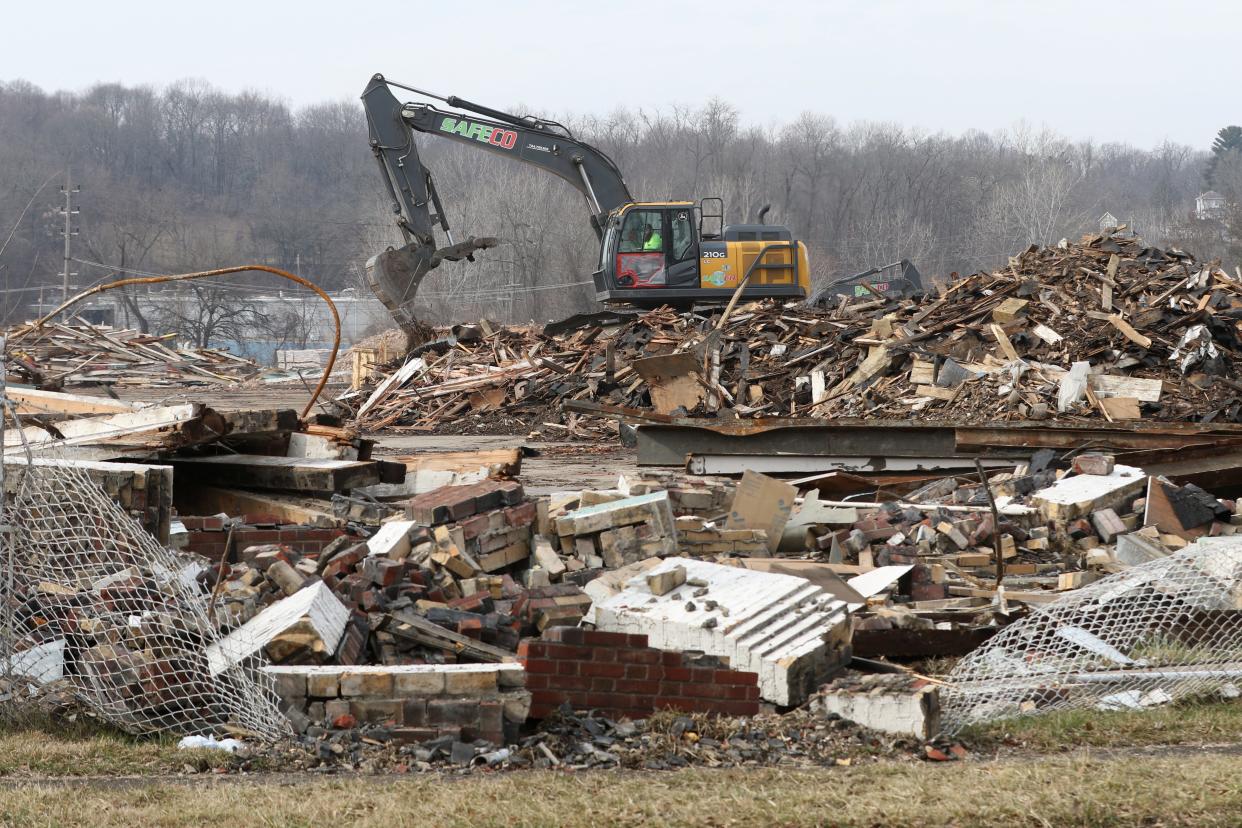With demo underway, land bank looks ahead to 2023 projects

ZANESVILLE − At the start of 2022, the Muskingum County Land Reutilization Corporation, better known as the land bank, was studying the possibility of rehabilitating the former Munson Elementary School into housing.
Those hopes were dashed on the harsh rocks of economic reality; decades of neglect, hazardous material abatement and the layout of the building combined to push the price tag to nearly double of early estimates. Instead, the land bank pivoted to demolition, and by the end of the year had secured funding to demolish two of the largest remaining areas of blight − the former school and the former Mosaic Tile factory.
"We wanted to make sure what we wanted to do was viable," said land bank Executive Director Andrew Roberts. "We quickly learned it wasn't something we were going to be able to economically do." With $500,000 of state funding set aside for demolition and site revitalization still needing to be spent, the land bank turned to demolition of Munson.
"The cost per square foot to rehabilitate Munson and get 26 units of housing was double the cost to take (the building) down and rebuilt 44 units of residential" Roberts said. "The numbers made sense" to knock the building down.
After the decision to no longer pursue Munson as housing, the land bank began to look at ways to develop it. That lead to a conversation with Columbus affordable housing developer Woda Cooper, which resulting in an agreement to develop housing on the site, pending tax credits from the state.
Things moved quickly after that, in terms of government speed. By June, Woda Cooper's tax credits were in place, and the state had announced long-rumored brownfield remediation funds, to the tune of $192 million across 41 counties. Muskingum County's share was $1.8 million, enough to cover demolition of the Mosaic Tile complex. Coupled with money to demolish Munson and additional remediation money, in the space of six moths the land bank had secured $2.435 million in grant funds. In November, gap funding for Woda Cooper's project at Munson, and additional project at the former McKinley School across town was approved, paving the way for 100 or so housing units.
A demolition contract for both sites was signed with SafeCo of Dilliner, Pa. in September. The combined cost of the two demolitions is $2,158,100, below budget. The former Mosaic Tile complex has been largely razed, with much of the material being recycled. SafeCo has six months to complete both demolition projects.
The land bank was well positioned to take advantage of a once-in-a-lifetime opportunity to clean up two blighted properties. With the land bank getting a 5% of delinquent tax funds, known as DTAC funds, a year it was able to leverage that $200,000 to get the $2.85 million in grants. Before the brownfield grants appeared from the state, Roberts said the land bank initially planed to use the DTAC funds to secure a bank note to pay for demolition of both sites. That meant 15 years of debt payments. "We had goals and a way to achieve those goals, this just made it way easier, way cheaper, and way faster," Roberts said.
Future plans
With the two demolition projects expected to be completed this spring, the land bank will turn its focus to the residential side, Roberts said. "We are going to start looking at what we can do with target areas, to redevelop housing in the urban core of the city."
The land bank established the first of three planned target areas around Brighton Boulevard last year. Last week, it established two more, one around Lee and State streets and another around Market Street just east of downtown. The primary purpose of all three are to encourage infill housing and commercial development, where appropriate. The land bank already owns several properties in each of the target areas, and will acquire more delinquent properties as they become available.
"Since 2019 we have effectively dealt with the three largest brownfield sites in Muskingum County," Roberts said. While the land bank plans to pivot back to its original mission of improving the county's housing opportunities, it has, in conjunction with the county's planning commission, applied for US EPA brownfield assessment funds to look at the former AEP power plant site in Philo. Word on those funds is expected during the second quarter of this year.
ccrook@gannett.com
740-868-3708
@crookphoto
This article originally appeared on Zanesville Times Recorder: With demo underway, land bank looks ahead to 2023 projects

